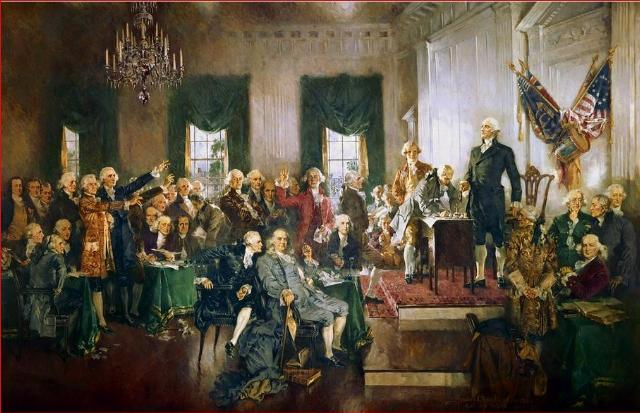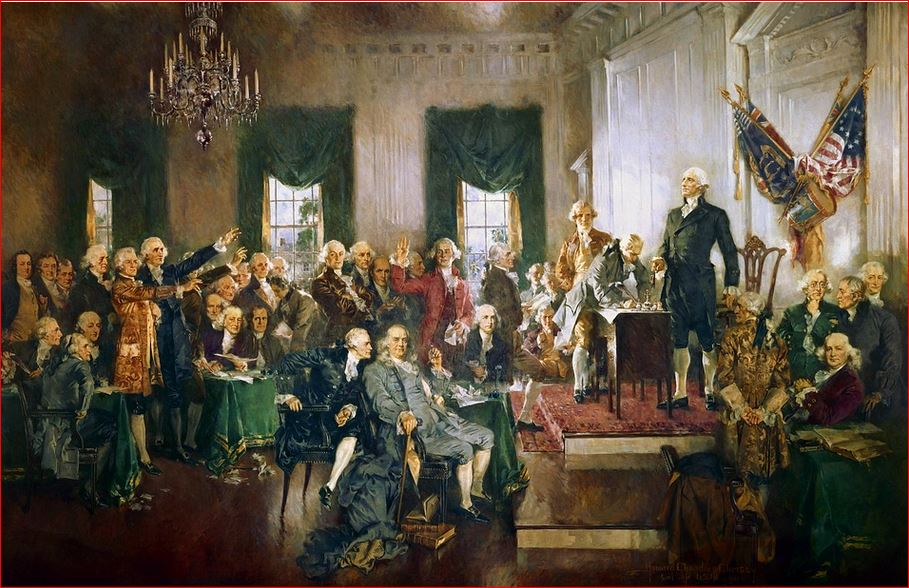

Photo Credit:Signing the Constitution
Pixabay
Our Founders were wise men, and the Electoral College was one of their best ideas to preserve minority rights across America, benefitting all Americans.Just the other day, Tim Walz stated explicitly that America needs to end the Electoral College. Although the campaign quickly walked this back, the reality is that he was speaking for most Democrats. That’s why it’s important for us to understand why the Electoral College matters and should continue.
Equality under the law is the bulwark of any free democratic nation that operates under the rule of law and values liberty and justice for all. This includes making the value of votes as equal as possible across a vast country. The U.S. Constitution’s Framers brought this concept as close to perfection as possible.
They accomplished this by creating a democratic republic, not a pure democracy. They were not so naïve as to think one person with one vote was enough to protect individual rights or that every vote would, by itself, carry equal weight. The Electoral College was their answer, for it prevents majority one-party rule and protects the individual rights of the minority better than pure democracy.
<img alt="Signing the Constitution" captext="Pixabay” src=”https://conservativenewsbriefing.com/wp-content/uploads/2024/10/conservatives-must-preserve-the-electoral-college.jpg” width=”550″>
The Electoral College, because it has the potential to override a national popular vote in a presidential election, may seem to infringe on individual rights. In truth, the opposite is true, for it protects individuals and states with minority views from majority electoral abuse.
Pure democracy works best at the state and local levels because it is closest to the individuals, who, by their geographic clustering, are more likely to be “birds of a feather” and are more apt to share a greater commonality of self-interests.
Additionally, when one-party rule appears at this level, it is more apt to remain localized and less likely to manifest as large-scale tyranny. The framers understood and anticipated that, at state the local levels, minority voters would be able to oppose an oppressive majority by voting with their feet—that is, they could move to another municipality, region, or state where their minority interests are better represented. Therefore, the Framers did not contemplate that mini-electoral colleges would be called for at state and local levels.
For this same reason, the Framers did not reject pure democracy for the federal legislatures. However, they originally provided better protection for individual state’s rights by having state legislators appoint senators. This changed when progressives pushed through the 17th Amendment in 1912.
Presidential elections, though, are different. People are voting for an executive who speaks and leads on behalf of all citizens of the nation. Without some protections, minority voters would have to leave the country, and minority states would need to secede from the Union to avoid the tyrannical abuses of a permanent one-party presidential succession.
Therefore, the Electoral College forces a candidate to campaign in minority and majority states and regions. After the election, it motivates the president to act more evenhandedly weighing both minority and majority interests to hold the office or keep his party in power.
Advocates of eliminating the Electoral College need look no further than one-party states like California to get a glimpse of what presidential elections would look like if the Electoral College were gone. Campaigns are directed solely to large population centers (which lean Democrat). Voters in the minority vote less frequently because they perceive (rightly) that their votes are worthless and their interests irrelevant to the state’s insurmountable majority.
The same would likely happen in America were the Electoral College removed. Rather than invigorating the rate of conservative voting in presidential elections, which some believe would be the outcome, it’s more likely that presidential elections without the Electoral College would depress and soft-suppress conservative voters both in majority and minority states.
We often focus on the benefits of the Electoral College from the perspective of the smaller, less populated states and their citizens because the Framers had them in mind when they designed the Electoral College. These were the regions the Framers wanted to protect from the “tyranny of factional majorities.” At that time, they did not focus on voters in more populated states who stood against the majority in those states.
In fact, voters with minority interests living within blue, one-party states often have more in common and have more shared political, social, and cultural interests with people in the smaller states. As such, their values are represented when the Electoral College protects the interests of those smaller states.
In truth, the Electoral College may be the last best chance for all non-Democrat party voters in America to have their distinct interests heard and represented, even if only by a sort of “proxy” through similarly interested voters in the smaller states.
If more people understand this benefit from the Electoral College, that may help offset the apathy and disillusionment minority voters in blue states feel. By voting, even in a blue state, they tell other minority voters across America that they are not alone, thereby sparking a wave of support in swing states or even shifting some states’ majorities. It may also motivate more voters to express support for keeping the Electoral College, and to resist efforts within their states to abolish it.
The Electoral College is not the antithesis of conservatism but is, instead, the epitome of conservatism in action. The Framers did not undermine individual rights and conservative principles when they created the Electoral College. Rather, with its creation, they established an ingenious method of protecting and preserving every individual’s right, especially those individuals and states in the minority, from the tyranny of a factional majority.





